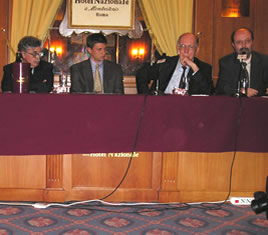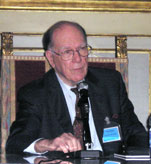
Home | Search | About | Fidelio | Economy | Strategy | Justice | Conferences | Links
LaRouche | Music | Join | Books | Concerts | Highlights | Education | Health
Spanish Pages | Poetry | Dialogue of Cultures | Maps
What's New
|
Press Release
|
 |
||
LaRouche in Dialogue with
Italian Political Leaders at Forum
in Rome, Italy
June 5, 2007
June 6, 2007 (LPAC) - American statesman, economist and Democratic leader Lyndon H. LaRouche, Jr. engaged in a high-level public discussion in Rome with Deputy Finance Minister Alfonso Gianni, and Giulio Tremonti, former Finance Minister and current vice chairman of the Italian Chamber of Deputies, on the theme: "The future of the economy: Market Radicalism orNew Deal?" All speakers addressed the current strategic and economic crisis and offered proposals for a solution, sometimes converging and sometimes differing, but all agreeing on the necessity to rebuild the world physical economy.
 |
|||
|
Mr. LaRouche in Rome
|
|||
Gianni expressed his agreement with LaRouche on the need for a new financial system: He stressed saving the welfare state from the assault of hedge funds, and introducing labor rights to a larger number of nations in order to promote fair economic competition. He said that a reviewed Keynesian approach could be considered to relaunch investments in the physical economy.
Tremonti noted that his high consideration of LaRouche's thinking, dates to when he read LaRouche's proposals for global infrastructural development for the first time, an impression which has been confirmed by the depth of LaRouche's intervention. It is rare to hear a politician locate his ideas in history, Tremonti said--and maybe his view is a "madman's view," but history often moves forward based on the views of such "madmen."
LaRouche spoke on June 5 to the Defense Committee of the Italian Senate; he is very widely known throughout official Italy as the author of the New Bretton Woods policy for an international reorganization of the bankrupt IMF monetary system. Italy's House of Delegates has twice voted for LaRouche's New Bretton Woods approach.
Thank you for supporting the Schiller Institute. Your membership and contributions enable us to publish FIDELIO Online, and to sponsor concerts, conferences, and other activities which represent critical interventions into the policy making and cultural life of the nation and the world.
Contributions and memberships are not tax-deductible.
VISIT THESE OTHER PAGES:
Home | Search | About | Fidelio | Economy | Strategy | Justice | Conferences | Links
LaRouche | Music | Join | Books | Concerts | Highlights | Education | Health
Spanish Pages | Poetry | Dialogue of Cultures | Maps
What's New
© Copyright Schiller Institute, Inc. 2007. All Rights Reserved.